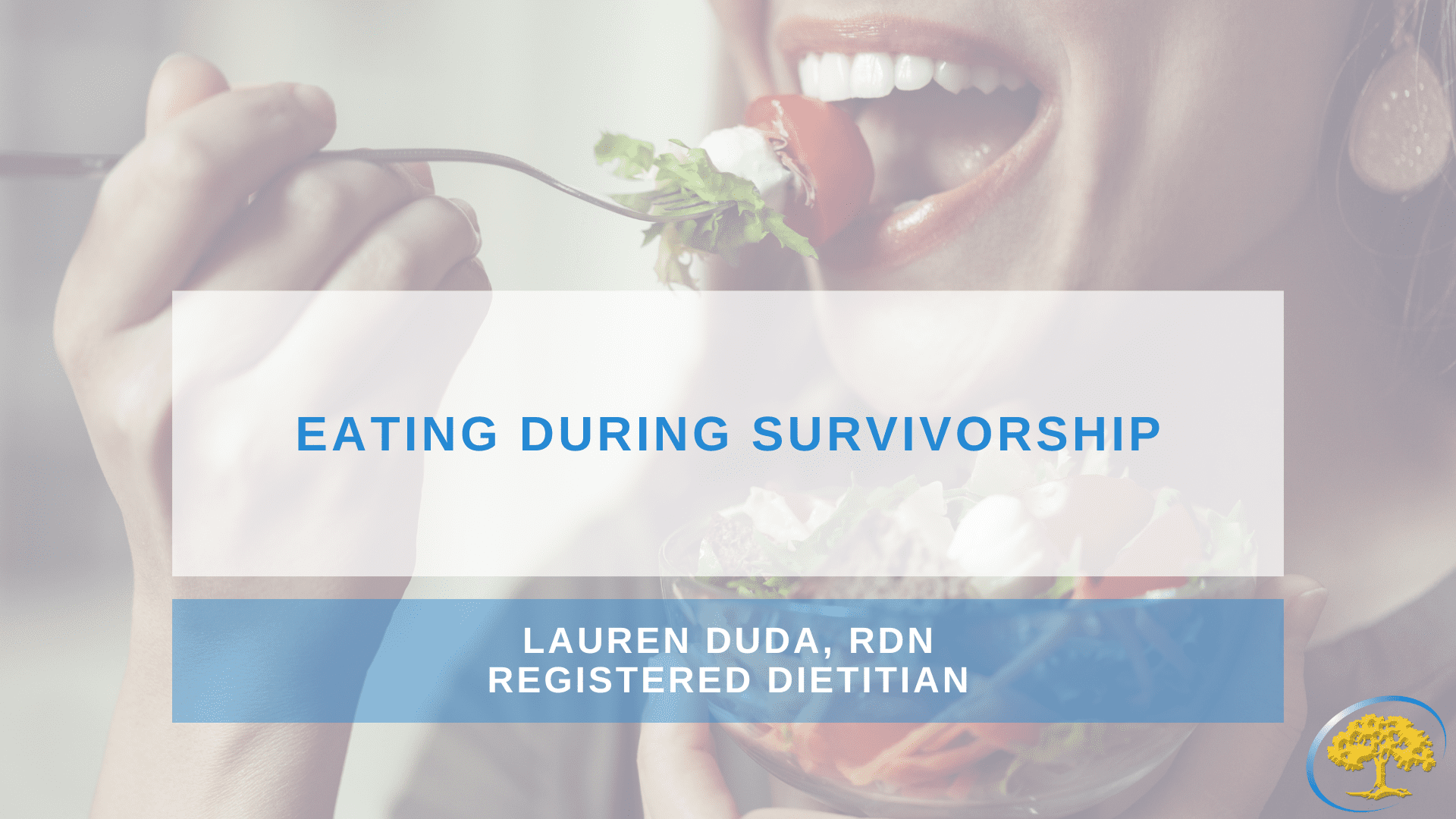
Posted 10 months ago
Eating During Survivorship
June is National Cancer Survivors Month, and with the month coming to a close, it is important to reflect and continue to understand nutrition during survivorship to lower risk of new cancer and/or recurrence. While this blog is aimed for those navigating life post-treatment, the recommendations in this article can be followed by individuals who are working towards reducing the risk of cancer altogether.
Adequate nutrition is important for several reasons in addition to reducing risk of cancer, including maintaining a healthy immune system, supplying energy to perform everyday tasks, recovering and healing, rebuilding and maintaining muscle strength, and reaching and maintaining a healthy weight. As a registered dietitian, the goal is to simplify the path to better nutrition and that starts with education. As treatment is completed, the road ahead can seem daunting, especially when figuring out what is best to eat. Luckily, with thorough and extensive research, the American Institute for Cancer Research (AICR) complied a list of guidelines to follow for cancer prevention.
1. Maintain a healthy weight. Several cancers have been linked to overweight or obesity (having a higher body fat content). Fat cells increase inflammation and release of hormones, resulting in our cells to divide and multiply more rapidly, increasing chances of cancer cells forming and continuing to divide.
2. Perform physical activity daily. Based on the Physical Activity Guidelines for Americans, adults are advised to perform 150 minutes of moderate-intensity activity, or 75 minutes of vigorous-intensity aerobic activity, per week. It is also encouraged that two days per week include muscle-strengthening activity. More movement is better than none, so even performing the basics like household chores, landscaping, gardening, and walking will help in decreasing the risk of cancer.
3. Eat a diet rich in fiber, vitamins, minerals, and phytonutrients. Plants, plants, plants. Plant-based foods such as whole grains, fruits, vegetables, beans, and nuts/seeds contain several cancer-fighting elements. Aim to include these foods on 2/3 of your plate and include a variety of plant colors.
4. Limit intake of processed, fried, sugary, high-fat foods. Fast food and most convenience foods contain higher amounts of sugar, fat and salt and are typically higher in calories. Eating foods that are more calorie-dense than nutrient-dense can increase the risk of becoming overweight or obese, furthering chances of developing cancer.
5. Limit intake of red meat and avoid processed meats. Consume between 12-18 ounces of red meat per week, if it is already regularly apart of your diet, to reduce risk of colon cancer. Processed meats, products that have been smoked, cured, salt, fermented, or contain preservatives, are to be completely avoided. Choose leaner animal proteins such as chicken, turkey, and fish, and don’t be afraid to have a meatless day here and there! Plant proteins such as legumes, nuts/seeds, hummus, and soy offer adequate amounts of protein.
6. Limit the consumption of sugary beverages. Water is the best option when choosing a beverage. Increased intake of sugary drinks has been linked to overweight and obesity, as these beverages contribute calories with little to no nutritional value. If water becomes to monotonous, opt for unsweetened teas, sparkling water, and fruit-infused water.
7. Limit the consumption of alcohol. Alcohol has been linked to six different cancers, no matter the form—beer, wine, or hard liquor. If you currently do not consume alcohol, it is not advised to begin. The Dietary Guidelines for Americans advises those who do choose to consume alcoholic beverages to limit their intake to no more than one drink per day for women and two drinks per day for men.
8. Do not take supplements for cancer prevention. Obtaining nutrients is best through a well-balanced diet. Eating a wide variety of foods will increase overall nutrient intake, such as lean protein, whole grains, colorful fruits and vegetables, healthy fats, and foods that contain dietary fiber. If you feel that vitamins and minerals are unable to be met through food alone, please speak with your healthcare provider before starting a dietary supplement.
You are not alone when it comes to navigating your eating habits in survivorship. As registered dietitians, we are dedicated to providing guidance when developing healthy lifestyle choices. Please reach out to one the registered dietitians at Ironwood Cancer and Research Centers to set up a consultation.
Lauren Duda, RD

Lauren’s interest in nutrition peaked at the age of 14, when she experienced a personal journey in developing her relationship with food. She decided that she wanted to help people like herself and educate the general public about nutrition. Becoming a registered dietitian was a clear career path and quickly became a dream of hers at a young age. Throughout the years, Lauren began to realize how necessary nutrition is in the management of disease, especially when witnessing her family members experience major health concerns. With this deepening her desire to care for others, Lauren ultimately knew that it was her goal to provide nutrition therapy in way that also values empathy, compassion, and kindness.
When she’s not working, Lauren loves spending her free time with friends, family, and her dog, Zeppelin. She enjoys listening to music, attending concerts, styling clothes, and hiking/biking during the cooler months.
